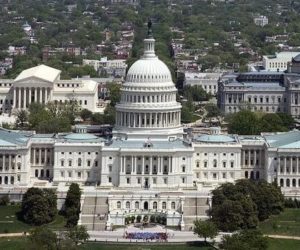The Washington Post reports today that Jeff Bingaman opened and closed the last of the pro-forma sessions for the chamber in the now-ending 110th Congress.
In less than 30 seconds this morning, Sen. Jeff Bingaman (D-N.M.) gaveled to a close a 14-month standoff between Senate Democrats and President Bush, effectively ending the contentious 110th Congress and also blocking any last-minute appointments by the White House.
At 10 a.m. ET sharp, Bingaman oversaw the last of the pro forma sessions of the Senate, an open-and-shut day in which just one senator gavels the chamber into session and almost immediately gavels it shut. So long as these occur every fourth day, the Senate has technically not gone into an extended recess, forbidding the president from making interim appointments to the cabinet, judiciary and the sprawling network of bipartisan commissions that oversee domestic industries.
For more than a year, Senate Democrats have succeeded in denying President Bush the opportunity to make recess appointments to court benches and other positions. This raises a couple of questions about the future of the balance of power between the executive and legislative branches of the federal government. First off, the ease with which the Democratic majority was able to do this highlights the fact that this leftover clause from colonial days is far past its expiration date. Congress frequently goes into recess, sometimes for extended periods. In the days when a trip from your home state to Washington could take weeks, if not months, of dangerous travel, this was a useful tool for presidents to keep the government operating. Today, no such barriers to rapid travel during an emergency exist. The power of the recess appointment is no longer needed and has only been abused, rather than used, by presidents seeking to short-sheet the process, making an end run around a recalcitrant Congress. They are intended to work together to the best of their ability, a process which should force some measure of bipartisan cooperation on them. Sadly, it seems that compromise has become a dirty word in American politics and left us with the standoff we’ve seen for some time now.
Given our government’s history over the last few decades, it is certainly not impossible that the Democrats will lose their Congressional majority some time in the next couple of election cycles while they retain control of the White House. Would Obama, a member of the party who so furiously decried recess appointments by Bush, do an about-face and attempt to use the same tool should the GOP regain the upper hand in the Senate? And if so, does this precedent set the stage for Republicans to automatically begin gaveling in pro-forma sessions for the duration of his administration?
Or, if the Democrats hold true to their stated positions, will they take advantage of their position of power to push for an amendment to the process? Would Obama willingly support the surrender of that particular executive power? It’s not something that could be done quickly or easily, of course, but even the attempt would say something about the core attitude of each party. As a bonus question, what of Bush’s use of “signing statements” to reject the ability of Congress to pass legislation which applies to him? Will Obama avoid that as well, or will he claim that what’s good for the goose is good for the gander? These are some of the tests Obama faces in his first term and only time will tell how well he performs.
















